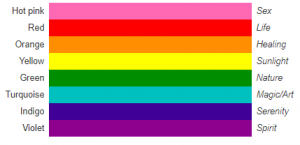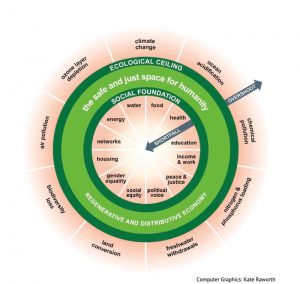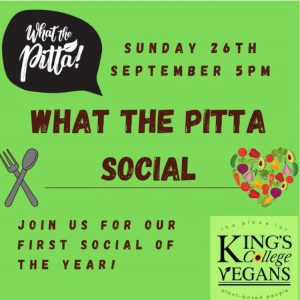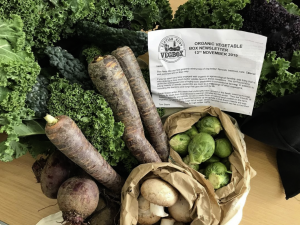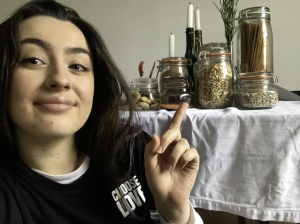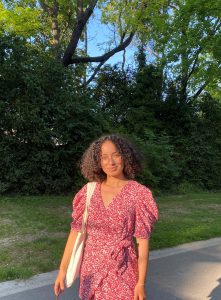Fetch Ur Veg is a student-run vegetable bag cooperative at King’s. If you would like to sign up, volunteer or join the committee, follow @FetchUrVeg on Instagram.
Can you tell us a bit about yourselves and your background?
[Liza] I’m a third-year BSc Nutrition student, and I’m originally from Belarus.
[Mia] I’ve just graduated with a BA in International Relations. I’m from Osaka, Japan and the UK.
What does sustainability mean to you?
[Liza] Sustainability is about maintaining a balance. It’s about how long and beautifully we can live and coexist with nature and maintain the diversity of the natural world.
[Mia] Sustainability is about caring about where things come from, how you’re using them, how long you’re using them and not taking them for granted. Also, remembering that the Earth doesn’t belong to us, but we belong to the Earth.
Is there a specific turning point you can identify that sparked your interest in sustainability?
[Liza] It started quite early on for me because I was in a school in Moscow that was incredibly sustainability-driven – which is quite funny to think about now because Moscow was and is not a very sustainable city. We were taught about recycling even though there weren’t any recycling systems in Russia, and everyone was encouraged to drop the personal drivers and use buses instead. So, I was conscious of it but never really cared that much. I really started caring because of my mother’s friend. She started promoting a healthy lifestyle from a food perspective, and I had terrible acne when I was younger, so eating healthily became a way for me to deal with my skin. And eventually, I caught onto the impact of food and the importance of eating sustainably. So yeah, I didn’t like see a picture of a seal with plastic and think, wow, poor seal. It was probably more of an egotistical way of getting into sustainability, hahaha.
[Mia] I think I started noticing sustainability after I went vegan. I decided to become vegan because it seemed fun and interesting, and then a friend told me about the sustainable benefits of a plant-based diet, and I was like, wow, that’s a great addition to this new diet. And from there, it was like a domino effect.
Could you tell us a little about Fetch Ur Veg?
[Mia] FUV was founded by two alumni of King’s, inspired by a similar initiative at a French university. I think students can find it difficult to find good quality vegetables or cook sustainably, or they’re just put off from cooking because it seems expensive to buy all the ingredients at once. But what the veg bag does is you don’t have to choose the vegetables – you get seasonal vegetables from local farmers which is more sustainable and at a discounted price. A weekly veg bag costs around £7.00 a week. If you have a small appetite, it’s just enough for two people, but if not, it’s perfect for one person. And if you volunteer, you can also get some extra veg on the side for free, which is always quite nice!
Our main goal is to offer a more sustainable way of getting your vegetable groceries and maybe stepping out of your comfort zone and encouraging yourself to cook with different ingredients. Each bag comes with a leaflet with recipes and cooking tips. Contrary to the supermarket, the vegetables you get are still covered in dirt. So you get an overall healthier diet, with a diverse set of vegetables that are not stripped of their nutrients or chemically processed and cleaned, and it just really makes you appreciate the food a lot more!
[Liza] Coming from my nutritional science background, I’ve been reading a lot about gut health and the importance of diversity in your diet. Experts recommend eating 30 different plant-based foods a week… and because FUV’s offering really follows the seasons, you’re guaranteed to get a larger diversity of veg.
Why did you decide to get involved and volunteer?
[Liza] I keep trying to remember how I found FUV… I remember really wanting to find a way to buy local veg that didn’t involve travelling to a farmer’s market (which aren’t always close by or accessibly priced). So when I saw this wonderful scheme (which I thought was a genius idea), I bought a veg bag and then signed up as a volunteer, and it sort of kicked off from there. I also thought it would be a great way to meet some cool fellow vegetable lovers! So I guess it’s like my love for vegetables that piqued my interest. I don’t know how many people can relate to that, hahaha?
[Helena] You touched upon an aspect of the community, and I think that was the strong pull for me. London is such a big city, and I feel like we’re very disconnected from where our food comes from – you know, it just lands in our supermarkets all cleaned and packaged. But other options aren’t necessarily as accessible. So FUV was just an obvious yes for me. But the other thing I was drawn to was the opportunity to volunteer and spend a couple hours each week, outside, just packing vegetables with a lovely group of people. It was always such a great way to get away from coursework, to feel the fresh air, feel connected to others, to the food I’ll be eating, to get my hands dirty. It’s very –
[Liza] – meditative and calming.
[Mia] I agree. It’s very therapeutic.
In what ways are you taking action on sustainability?
[Mia] A lot of me being sustainable comes from actually being quite frugal. So there are certain things I haven’t bought in years, such as kitchen towel or clingfilm – I’ll just use a cloth or cover it with another bowl or plate. When I’m in London, I use apps like Karma, Olio or Too Good to Go. Karma and Too Good To Go allow you to buy leftover produce or goods from stores at a reduced price, so they’re great if you live in a busy city with lots of surplus food. Olio lets you give produce you won’t use to people in your community. For example, if you buy a bottle of cordial and try a little but don’t like it, you can put it on Olio, and someone from your community will come and pick it up. So those are great ways to shop more sustainably, tackle food waste and save money!
If you’re an international student, your friends will probably move around a lot. Everyone always has awkward bits of salt or some cling film or soap, etc., things that they don’t want to take with them. So you can always help them out by taking those, and it’s a perfect way to just keep things going around. I really think the best thing is to just try and make do with what you have and see how far you can go with one product.
If you make one change, it inspires you to make another one, and another one and it keeps going. Take it slowly, and don’t bash yourself for using one piece of plastic sometimes because it will not be perfect. It’s the same with being vegan. I don’t think anyone should be forced to be vegan 100% of the time, and in many places, you just really can’t be vegan 100% of the time. So I just suggest that people be maybe 5% more sustainable than they were last week and then just keep increasing that number, in ways that are convenient for you.
I would add that with FUV, our goal is not to make people become vegan. We just hope that the bags will inspire you to have one plant-based dish a week and try new recipes. And when you try plant-based foods, don’t focus on how/if it’s similar to meat; approach it with curiosity and awe that we’re able to make some really creative foods. Like how on earth did someone think to mix tapioca starch and three flavourings together and make it taste like fish? It’s insane. Being curious and enjoying the process is the most important thing.
Can you recommend a resource (book, activist, documentary, social media account) for people who’d like to learn more?
[Liza] Ooh, ok, I have to say Ottolenghi. I mean, he’s like the God of vegetable cooking. So his recipes have been hugely inspiring for me and have allowed me to discover how to cook so many different vegetables.
[Mia] I really love the Zero Waste Japan account – it’s run by a mum of two young kids, and it’s quite wholesome. Everyone probably knows Max Lammana, Alice Aedy and Jack Harries – they’re all really great activists. But I tend to prefer Japanese resources in English because while it’s crucial to be bold and make really clear statements about how we can be more sustainable, I personally think that taking a more gentle approach encourages many more people to make small changes. Whereas activists can sometimes be quite daunting because they’re so passionate about the subject, and even if it’s for a really great cause, I think it can create a barrier for people who are sceptical about this subject. If you’re looking for Asian vegan recipes, @okonomikitchen and @chez.jorge are great!
What is something that currently gives you hope for the future?
[Mia] From the time I moved to London, which was only three years ago, I think the amount of vegan options has quadrupled. People I know are huge meat eaters, people who you didn’t expect will be like, oh, that’s interesting. My grandma recently bought regular lasagna for everyone else, but she saw all the M & S plant kitchen options and bought me 6 different things to try over the weekend. Living sustainably has become integrated into many aspects of our lives. It’s so easy to focus on the negatives, but many little changes really add up to a lot. I think we just need another big push, and I believe sustainable lifestyles will become the norm. I think that everything is moving in the right direction, considering that people who probably had no idea about sustainability a few years ago have at least a small idea now.
[Liza] I’m a bit more pessimistic… Maybe renewable energy will have a breakthrough, or a miracle kind of battery for electric cars that isn’t bad for the environment will be invented that isn’t also bad for the environment. Yeah, still waiting for a miracle, I suppose.
Thank you, Liza and Mia! The ‘Sustainability Stories’ series seeks to highlight the work and passion of individuals from across the King’s community. If you would like to get involved, get in touch with us.

